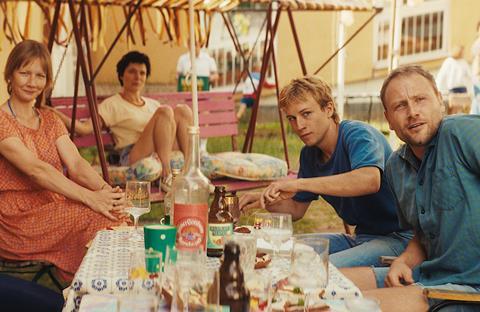Sandra Huller takes a central role in this sentimental heist comedy set in East Germany of 1990 which kicks off the Munich Film Festival

Dir/scr: Natja Brunckhorst. Germany. 2024. 115mins
Talk about quick off the mark. In July 1990, East Germans were given exactly six days after their currency was replaced by the West German mark to exchange any ‘old’ coins and banknotes they had been hoarding. A monetarist trauma that made for a mere footnote in Good Bye, Lenin! becomes the main story driver of sentimental unification comedy Two To One – a title taken from the unfavourable exchange rate that was imposed on ‘Ostmark’ swaps.
A light-hearted comedy with its heart in the right place
Writer/director Natja Brunckhorst – who first came to attention as the teenage protagonist of Uli Edel’s Christiane F. (1981) – delivers a light-hearted comedy with heart, even if it lacks drama. Fuelled by a mix of twinkly Ostalgie (nostalgia for East Germany) and a more diffuse, universal sympathy for those ordinary people who get dumped off the capitalist truck when it hits a bump in the road, Two To One benefits from the presence of Sandra Huller, who will will attract audiences despite a flimsy role. Opening the 2024 Munich Film Festival before hitting German cinemas on July 25, it has already sold to territories including Spain, France, Greece and Australia, where it should work reasonably well as ‘arthouse lite’ programming.
It’s the long, hot summer of 1990 in a housing estate outside Halberstadt, East Germany, that appears to have been built for the families of industrial workers. The torpor we feel in this suburban enclave, with its dilapidated socialist-modern buildings and tatty communal gardens, isn’t just climatic. Back then, in the months between the fall of the Berlin Wall and unification, East Germans were living in a limbo, not knowing quite where they were headed. Some of the residents of what is depicted as a close-knit community have already ‘gone over’ – upped sticks and moved west. Genial giant Volker (Ronald Zehrfeld), on the other hand, took his chances in Hungary – but now he’s back to being the awkward third wheel in the steady-ish relationship between free-spirited mother of two Maren (Huller) and her loving but jealous partner Robert (Max Riemelt).
While Maren’s teenage son Jannik (Anselm Haderer) gets chased by the increasingly demotivated local police for the anti-unification graffiti slogans he scrawls around the estate, Maren, Robert and Volker set off on a ‘revolutionary’ caper of their own with the help of Markowski (Peter Kurth, in the film’s most affecting character turn), a curmudgeonly older relative with a drinking habit. He just happens to work in the underground storage facility where the East German government had been dumping sackloads of obsolete Ostmarks, because they don’t have the capacity to burn them. That part of the story is – remarkably – true, as is the fact that many were stolen before the notes were finally incinerated in 2002. But Brunckhorst’s script finesses the timescales to allow Maren and her merry men to walk away with bundles of East German banknotes when there was still the briefest window of opportunity to spend them.
We have to take on trust the loopholes which enable these last-minute exhanges – such as the ability to give cash to returning East German diplomats who have a longer window to exchage their Ostmarks. These, however, allow us to get to the real meat of the matter, which is to show how a community raised on socialist values reacts when sudden riches arrive. Solidarity and greed face off, and the desire to give something back to this betrayed and disenfranchised place overlaps with a desire to stick it to the man. The man, in this case, being both those rapacious West Germans who are speculating on a place they positively want to fail, and the representatives of a former socialist regime that was supposed to serve the people but ended up feathering the nest of party officials and high-ranking apparatchiks.
The curious lack of tension of the two heist scenes set in the underground bunker sets the easy tone for a comedy where conflicts tend to fizzle out before they become either tense or funny, and story development is too often replaced by cute montage scenes set to an indie country soundtrack. Trabant cars, a Barkas B1000 (the East German equivalent of the VW Kombi van) and the perfectly gauged not-yet-Western dress sense of these in-between Germans will raise a smile, especially on home ground – where the director’s decision to cast only actors from the former East Germany should also garner some kudos. But it’s the film’s location scouts who really deserve a prize for having found some handsome surviving examples of socialist modern architecture, public art and stylishly hip interiors to act as backdrops to this sunny power-to-the-people meander.
Production companies: Row Pictures, Zischlermann Filmproduktion
International sales: The Playmaker, worldsales@playmaker.de
Producers: Suzanne Mann, Karsten Stoter, Paul Zischler, Martin Rehbock
Cinematography: Martin Langer
Production design: Jenny Roesler, Florian Kaposi
Editing: Ramin Sabeti
Music: Hannah von Hubenet, Amaury Laurent Bernier
Main cast: Sandra Huller, Max Riemelt, Ronald Zehrfeld, Ursula Werner, Peter Kurth, Martin Brambach, Kathrin Wehlisch, Anselm Haderer, Lotte Shirin Kelling























